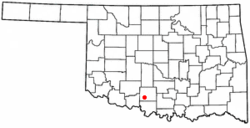Comanche, Oklahoma
| Comanche, Oklahoma | |
|---|---|
| City | |
 Location of Comanche, Oklahoma |
|
| Coordinates: 34°21′55″N 97°58′7″W / 34.36528°N 97.96861°WCoordinates: 34°21′55″N 97°58′7″W / 34.36528°N 97.96861°W | |
| Country | United States |
| State | Oklahoma |
| County | Stephens |
| Area | |
| • Total | 4.6 sq mi (11.8 km2) |
| • Land | 4.6 sq mi (11.8 km2) |
| • Water | 0.0 sq mi (0.0 km2) |
| Elevation | 988 ft (301 m) |
| Population (2008) | |
| • Total | 1,696 |
| • Density | 340.1/sq mi (131.3/km2) |
| Time zone | Central (CST) (UTC-6) |
| • Summer (DST) | CDT (UTC-5) |
| ZIP code | 73529 |
| Area code(s) | 580 |
| FIPS code | 40-16450 |
| GNIS feature ID | 1091585 |
Comanche is a city in Stephens County, Oklahoma, United States. The population was 1,556 at the 2000 census.
Comanche is a small city in southwest Oklahoma set in rolling prairie land interspersed with oil fields, ranches, farms, pecan orchards, and timbered areas. Comanche is located in what was once the famous Louisiana Purchase, a part of which was later in 1855 designated Indian Territory, and set aside for the Five Civilized Tribes. Comanche then became part of the Chickasaw Nation and was identified as Comanche, Indian Territory until statehood in 1907. The city has had a series of names. The first settlers lived north of the present site and called the settlement Tucker. With the coming of the Rock Island Railroad in 1892, Indian landowner Johnny D. Wilson gave the city its present site on the railroad, and the Tucker post office was moved here in 1893. Many had wanted to call it Wilson Town, and some called it Border Queen because of the annual large celebrations, carnivals, bands, and Indian activities. Mr. Wilson, however, insisted it be named Comanche because of the Comanche Indians who roamed here. So, Comanche was incorporated November 23, 1898 and began its progress. After the Civil War, large herds of cattle moved up the Chisholm Trail located about two miles (3 km) east of present-day Comanche. The cattle were driven from Texas, through Indian Territory to Kansas for shipment east. Parts of this historic trail can still be clearly seen today. Comanche has a colorful history that is still reflected in its lifestyle and activities. A western flavor is felt here, and Comanche is often called the "Rodeo Capital of the World". Certainly, many World Champion Rodeo performers call Comanche home. Race horse, Quarter Horse owners, and farmers add their influence as do oil companies and oil field workers. Authentic Indian customs and tribal observations are still practiced. Artists, educators, and others add still more variety and culture. Truly, it can be said that Comanche's greatest asset is its diversity of talent and people.
Comanche is located at 34°21′55″N 97°58′7″W / 34.36528°N 97.96861°W (34.365189, -97.968640).
...
Wikipedia
